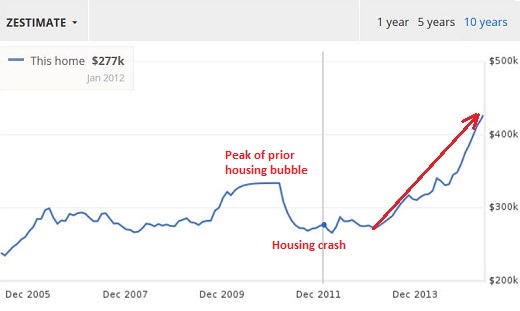On Tuesday, I posted, This Is How Insane San Francisco’s Housing Bubble Really Is. A number of commenters shared their experiences in the Bay Area, confirming just how crazy the situation has gotten beyond San Francisco itself. In other cities in the country, home prices have shot up too.
Housing bubbles have also matured into magnificent bloom in Canada, particularly in Toronto and Vancouver, in Australia, New Zealand, the UK, particularly in London, a number of cities in Germany, and in other countries. Money printing and interest-rate repression by central banks perform true magic on inflating asset prices – including home prices.
While the jury is still arguing over which city has the craziest housing bubble: San Francisco, New York City, Vancouver, Toronto, Melbourne, etc., David in Texas sent me an email to paint a similarly crazed scenario, albeit with smaller numbers, for an unexpected bubble candidate, Dallas.
The national indices don’t always reflect what is happening on the ground. It helps to get some granular details. So here is one of them for Dallas, where the oil bust has had no impact on the blooming housing bubble. Not yet, at least, as far as we can tell.
By David in Texas:
I realize you have a different level of insanity in the Bay Area, but here’s an anecdote from Dallas that shows the madness has accelerated here, despite the oil price declines.
This is the Zillow chart for a friend’s house just west of the Park Cities (the old money part of Dallas). It is a gentrifying neighborhood where the old cottages are being torn down and McMansions built at a furious pace.
Her house is a 2/1, ~ 1300 sq. ft., built in the late 1940s and updated sporadically since then. I realize the same house in the Bay Area is probably $1m plus, but the acceleration of prices in Dallas is mind-boggling to me. According to Zillow, the house was worth $386K in January, and $427K now. It’s up 88% from January 2012,
I’m not sure how accurate Zillow is overall, but this trend reflects what I’m seeing in that neighborhood.
Buy, buy, buy before the opportunity is gone, is the thinking – among a lot of people and not just pushy real estate brokers. A few less desirable neighborhoods nearby (or formerly less desirable) are becoming flip-central. Party like it’s 2006! By David in Texas.
Inflating home prices, as the Fed has purposefully strained to do for years, has a different impact than inflating stocks and bonds. When stocks and bonds soar into absurdity, people don’t have to live in them…. So in this environment, how many years does it take to save up for a down payment in San Francisco and other US cities if you earn the local median income? Are you sitting down? Read… How Soaring Housing Costs Impoverish a Whole Generation and Maul the Real Economy
Enjoy reading WOLF STREET and want to support it? You can donate. I appreciate it immensely. Click on the mug to find out how:
![]()



These people are praying for an ISIS/ISIL victory in Saudi Arabia. Strange bed partners indeed.
No one I know is praying for an “ISIS victory in Saudi Arabia.” I’m not sure where you got this idea.
The same thing is happening in Denver. Homes in less than desirable neighborhoods are being flipped and sold for 50k+ profits for investors and flippers. I don’t know if Denver is in a true bubble, but the median home price has reached a new high here: $402k. Seems insane to me as wages have not kept up with the cost of living (buying or renting) in Denver.
I saw craziness in housing in Dallas and Houston in the early 80s. Also saw quite a number of people whom I knew well walk away from homes after they lost their oil industry jobs. And only two or three years before, oil companies were offering us jobs as soon as we finished our MS degree course work. Do the thesis on their dime.
I Guess it is all different this time. It sure seems like a lot of people do believe that. Where are all the buyers coming from and in which industries are they employed?
The new neighbors that I have met are all in “structured finance” or some other banking-related field. There are new little banks and popping up all over the place, too.